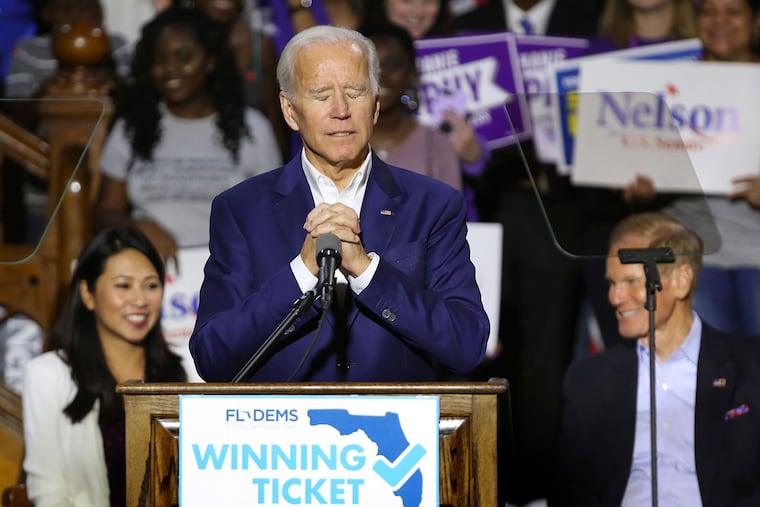As 2020 Democratic candidates line up, who’s most likely to appeal to Pa.? | John Baer
With the field of Democratic candidates for president continuing to grow, state political experts hold forth on who, or what type candidate, most likely can win the Pennsylvania primary and carry the state in the General Election.

There’s a fairly broad consensus among political types that, if he’s in, Joe Biden is favored to win Pennsylvania’s 2020 Democratic primary and, if nominated, carry the state in the general election.
Not unanimous. But fairly broad.
After all, Biden feels like a fit. Born in Scranton, lived there as a child. Well-known. Not a socialist. Older guy (he’ll be 77) running in one of the oldest states in terms of folks over 65.
And nationally, in a large (and largely unknown) field, Real Clear Politics’ average of polling has Biden up 10.7 points.
But a sampling of state pols, pollsters, consultants, academics, party leaders and others also reflects lots of “hey, who knows?”
It’s early. Polls change. Many Democratic leaders are coy.
Take state party chief Nancy Patton Mills: “Too early to have this discussion. I will stay neutral and listen to voices.”
OK. But people are talking. The state can be crucial. So, let’s talk. What’s Pennsylvania want? Someone familiar? Someone new? Progressive? Moderate?
First let me note, as a lesson of 2016, and knowing how Democrats can eat their young, I don’t dismiss President Trump’s chances of winning the state again.
What we’re talking about here are Democrats most likely to do well in Pennsylvania, and why. Here goes.
U.S. Rep. Dwight Evans, a Philly Democratic, studies state politics, has for decades: “This state tends to be more center-right than center-left, or maybe even middle-of-the-road.”
Split congressional delegation. One senator from each party. Divided government in Harrisburg.
That, says Evans, favors Biden. Or moderates such as Minnesota Sen. Amy Klobuchar or Ohio Sen. Sherrod Brown.
Temple poli-sci prof Robin Kolodny also sees Biden, and doubts that California Sen. Kamala Harris or New Jersey Sen. Cory Booker would prevail in a multi-candidate primary. Kolodny’s guessing, “Bernie [Sanders], if he lasts, cuts into support for Harris and Booker, in particular.”
Allegheny County Executive Rich Fitzgerald likes the Western Pa. model of Democratic U.S. Rep. Conor Lamb, who won a special election last year in a district south of Pittsburgh easily carried by Trump in 2016:
“Progressive but not too far left, talking pocketbook issues, education, infrastructure, somebody who can appeal to urban areas and especially western rural counties like Greene, Westmoreland, Butler, that went heavily for Trump.”
Names? Fitzgerald suggests Biden, Brown, Klobuchar, possibly Booker or Harris. Maybe even former Texas U.S. Rep. Beto O’Rourke.
That squares with Franklin and Marshall College poll methodologist Berwood Yost.
Yost says Trump won with appealing to white working-class voters’ concerns about “immigration, race and being `American,’ which motivated their turnout. … Someone who can reduce the importance of `race’ and elevate the importance of `economics’ will have more success.”
When pressed, Yost says, Sanders, Brown or Biden “could sell the economic message … but I think the most energy in the party comes from women voters.”
Mary Isenhour is a Democratic strategist, veteran of several presidential campaigns, former top aide to Gov. Tom Wolf, and now a consultant with the Harrisburg-based firm Rooney Novak Isenhour Group.
She leans Biden “if he gets in,” but calls Klobuchar “interesting,” and says Harris has “great appeal to younger voters.”
And younger voters? Seem more engaged. Turnout was up in 2018.
Stephen Rudman, a Montgomery County election-law lawyer, is president of Pennsylvania Young Democrats. Anybody under 40 is eligible. He says of four-million-plus registered Dems in the state, 1.4 million are under 40.
He tells me South Bend, Ind., Mayor Pete Buttigieg is “definitely somebody young Democrats are looking at nationally.”
Buttigieg (Boot-edge-edge) is 37, a Harvard Phi Beta Kappa member, Rhodes Scholar, Afghan War vet, openly gay Democrat from a red state.
(Since 1968, Indiana voted Democratic for president once, Barack Obama, 2008.)
Rudman says this year’s national convention of Young Democrats of America is in Indianapolis (in July) largely because of Buttigieg. He also says young Dems like Harris, Brown and Massachusetts Sen. Elizabeth Warren.
And check the “gut” of St. Joseph’s University poli-sci adjunct prof Joe Powers, a Pennsylvania native who worked decades in state government and politics.
“My gut tells me none of the older candidates. Not Biden, Warren, Sanders. Of the five nonincumbent Democrats elected president over the last century (FDR, Kennedy, Carter, Clinton, Obama), all were 52 or younger,” he notes. “I see something like that happening again because I see a change election.”
Harris is 54; Klobuchar, 58; New York Sen. Kirsten Gillibrand, 52. (Biden, Brown, Sanders, and Warren are all older.) Booker is 49, O’Rourke, 46; former San Antonio, Texas, Mayor (and former HUD secretary under Obama) Julian Castro, 44, and there’s Buttigieg.
There are, and likely will be, others. Who knows who emerges?
And because there are 22 Democratic caucuses or primaries before our April 28 primary, a key for Pennsylvania is who’s left when the race gets here.
We could be inconsequential. Or decisive. And, especially if there’s no Biden, we could be very interesting.